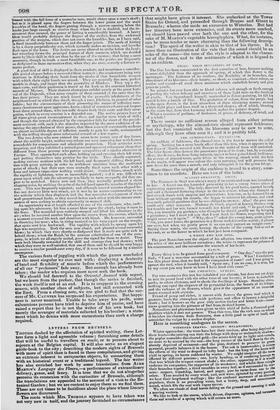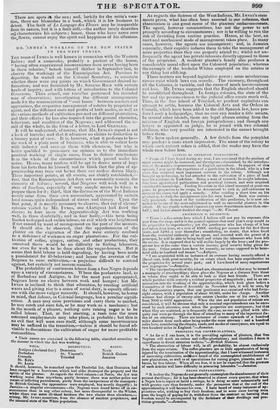LETTERS FROM BRUSSELS.
'THOUGH dashed by the affectation of spirited writing, these Let- ters form a light and agreeable volume ; furnishing some details that will be useful to travellers en route, or to persons about to sojourn at the Belgian capital. It will also serve as an elegant guide-book to the city ; describing the modern sights of Brussels with more of spirit than is found in those compilations, and giving an extrinsic interest to antiquarian objects, by connecting them with an historical event or a traditional legend. The fair writer has also enriched her work by some translations from Alma MARTIN'S Langage des Fleurs,—a performance of extraordinary delicacy, grace, and fancy. It is true that we do not altogether perceive its connexion with the curiosities of Brussels, although the translations are appended to the account of a visit to the Bo- tanical Garden ; but we are content to enjoy them as we find them. These are not times to be fastidious about the place where literary flowers are discovered.
The route which Mrs. THOROLD appears to have taken was not very new in tself, and the journey furnished no circumstances that might have given it interest. She embarked at the Tower Stairs for Ostend, and proceeded through Bruges and Ghent to Brussels ; whence she made an excursion to Waterloo. But had her itinerary been more extensive, and its events more marked, we should have passed over both the one and the other, for the sake of M. MARTIN'S vegetable hieroglyphics. What, for instance, can be more tender or more charming than the following descrip- tion ? The spirit of the writer is akin to that of his theme. It is more than an illustration of the rule that the sound should be an echo of the sense—the tone of the style is adapted to the charac- ter of the flower, and to the sentiments of which it is feigned to be an emblem.
LILAC. FIRST SENSATIOXS OF LOVE.
The lilac has been consecrated to the fit st seusation of love, because nothing is more delightful than the approach of spring, of which this flower is the messenger. The freshness of its verdure, the flexibility of its branches, the abundance of its blossoms—their beauty, so short, so transient—their colour, so tender and varied—all recal those emotions which embellish beauty and give grace to youth. No painter has ever been able to blend colours soft enough or fresh enough to portray the velvet delicacy and sweetness of those light tiuts on the forehead of youth. Van Spaendonek himself, :unrivalled in flower-painting, let fall his pencil before a bunch of lilac. The gradation of colour, from the purple bud to the open flower, is the least attraction of these charming masses, around which light plays and loses itself in a thousand shapes; all of which, blending in the same tint, form that harmony which makes the painter despair. What a reunion of perfume, of freshness, of grace, of delicacy, of detail, and of a whole !
There seems no sufficient reason alleged from either nature or mythology, why the almond-tree should represent fickleness; but the fact connected with its blossoms may be new to some, although they have often seen it ; and it is prettily told.
THE ALMOND-TREE. IICELEN msg.
An emblem of fickleness, the ahnoml-tree is the first to answer the call of spring. Nothing has a more lovely effect than this tree, when it appears in the first (lays of March, covered with flowers in the midst of trees still unclothed. The later frosts often destroy the precocious germ of its fruit ; but, by a singular effect, the flowers, far from being injured, apsear to have gained fresh brilliancy. An avenue of alinond-trees, quite white in the evening, struck with the frost in the night, will appear rose colour the next morning, and will preserve this new dress for more than a month, and only relinquish it for the green foliage.
Sometimes the origin of the emblem is traced to a story, some- times to an anecdote. Here are two of the latter.
SCARLET GERANIUM. FOLLY.
The Baroness (le Staid was always angry if an untalented man was introduced to her. A friend one day hazarded presenting to her a young Swiss officer of
captivating appealance. The lady, deceived by his good looks, exerted herself, and said a thousand flattering things to the new-coiner, whom she thought at first struck dumb with surprise and admiration ; however, as he listened for an hour without opening his mouth, she began to mistrust his silence, and asked him such pointed questions that he was obliged to answer. Alas! the poor man could only utter nonsense. Madame de Staid, piqued at having thrown away her trouble and her wit, turned towards her friend and said, " In good truth, Sir, you resemble my gardener, who thought be should gratify me by bringing a geranium ; but I must tell you that I sent back his flower, requesting that I might never see it again." " Why, then ?" asked the young man, quite aghast. " Sir, you must know, the geranium is a flower well dressed in scarlet; it pleases our eyes, but when we gently press it we can only extract an insipid scent." Saying these words, she arose, leaving the cheeks of the young fool as red as his coat, or as the flower to which he had just been compared.
A WHITE AND RED ROSE.
The poet Bonnefous sent the object of his affection two roses, one white and the other of the most brilliant carnation ; the white to represent the paleness of his countenance, and the carnation the warmth of his heart.
A FANCY.
Every thing is to be gained from good company. " One day," says the poet Sadi "I saw a rose-tree surrounded by a tuft of grass. What ! I exclaimed, has !Ids plant done, that we find it the companion of roses? and I was going to uproot the turf, when it humbly said, ' Spare me; I am no rose, it is true, but by my scent you may know at least I have lived with roses.'"
THE CHESTNUT. LUXURY.
For two centuries this tree has inhabited our climate, but does not yet deign to mix its proud head with the other trees of our forests; it loves to embellish parks, to adorn chateaus, and to shade the dwellings of kings. Standing alone, nothing can equal the elegance of its pyramidal form, the beauty of its foliage, and the richness of its flowers, which give it the appearance of an immente lustre covered with crystals.
Friend of pump anti riches, it covers with flowers the green turf which it protects, loads the atmosphere with perfume, and cffers to luxury a delightful shade ; but it bestows on the poor only useless timber and bitter fruit—some- times granting hint the pittance of fuel from its dried leaves. Naturalists and physicians have given to this child of India a thousand good qualities which it does not possess. Thus this tree, like the rich man on whom it lavishes its charms, finds flatterers, does a little good in spite of itself, slid astonishes the vulgar by a useleas display.
Here is something analogous to the season.
WITHERED LEAVES. SORROW: stELAsicitor.v. Winter approaches: the trees have lost their verdure, after being deprived of their fruits—the retiring sun tints the foliage with deep or melancholy shades.— the poplar resembles discoloured gold—the acacia folds up its light seed-vessels, no more to be aroused by the sun—the long tresses of the birch float in the air, already deprived of ornament—and the pine, destined to preserve its Me: pyramid, proudly balances it in the breeze. The oak is immoveable; it reser_ the efforts of the wind to despoil its lofty head : but the lung of the forest will yield to spring, its leaves reddened by winter. We might imagine all the tree:, affected by different passions; one, lowly bending, as if rendering homage .. that tree which the tempest cannot shake ; the other, appearing as if it wool!' embrace its companion, the supporter of its weakness ; and whilst thesemingla their branches together, a third trembles in every leaf, as if surrounded by et. mica: respect, friendship, hatred, and anger, pass by turns from one toot:: other. Thus assailed by every wind, and, as it were, agitated by ever we hear their lengthened wailings ; like the confused murmurs of a populace, there Is no prevailing voice, but a heavy, deep, andmi a P a nolatornmoedus sound, which fills the soul with vague terror.
We often see clouds of dead leaves falling on the ground and covering it with a moving vesture.
We like to look at the storm, which drives, disperses, agitates, and tonal it5
these sad wrecks of a spring which will return no more.
There are spots it the sun; and, luckily for the critic's voca- tion, there are blemishes in a book, which it is his business to detect. The fault of Le Lungage des Hears may be inseparable from its nature, but it is a fault still,—the author rarely describes or; characterizes his subjects ; hence, those who have never seen the.flower, cannot enjoy the spirit and happiness of his allusions.



























 Previous page
Previous page